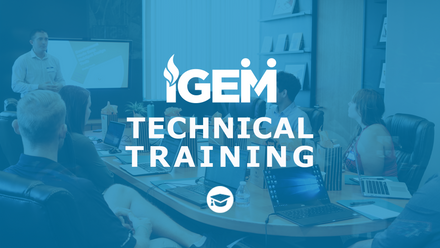Course summary
This engaging and practical course examines steel pipelines for high pressure gas transmission from two perspectives. It considers first the principles for design, build, commissioning, maintenance and operation as presented in IGEM/TD/1 Edition 6. The models for assessing the risks of high pressure natural gas pipelines are then introduced, as adopted in IGEM/TD/2 Edition 2. The course provides individuals with the confidence to apply the principles of these standards, assuring continued industry best practice.
Learning outcomes
- An understanding of pipeline best practice, based on IGEM/TD/1
- Recognition of how IGEM/TD/1 affects every role within the gas transmission lifecycle
- An ability to apply the basic principles identified in IGEM/TD/1
- The confidence to apply risk management methodology to pipelines designed, constructed and maintained in accordance with IGEM/TD/1 and IGEM/TD/2
- The skills to identify mitigation measures that reduce risk
- The expertise to identify preventative and corrective measures associated with pipeline failures
Course content
This course is delivered across three three-hour sessions and comprises a varied portfolio of presentations, applied activities, and shared group learning.
IGEM/TD/1 overview
- Management systems for pipelines and associated equipment
- Planning, legal and stakeholder considerations
- Materials for pipelines and associated installations
- Handling, transport and storage of steel pipe (SUP1)
- Designing pipelines
- Population density, proximity awareness and area classification
- Constructing pipelines
- Testing pipelines and associated installations
- Commissioning pipelines and associated equipment
- Protecting against corrosion
- Operating and maintaining pipelines
IGEM/TD/2 overview and IGEM/TD/1 – practical application
- Risk assessment models
- Failure of hazardous gas pipelines – consequences and assessment and predictions
- Calculation of individual risk and societal risk
- IGEM/TD/1 designing out the risk, risk mitigation during construction and operation
- Risk assessing attendees’ infrastructure
Who should attend?
Anyone who wishes to understand the controls imposed upon the high pressure gas transmission system. Those working in all phases of the pipeline lifecycle – from planning, to design, construction, operation and maintenance. The course currently attracts a varied audience including engineers, operators and constructors, all of whom wish to identify how their roles impact on other stakeholders.
Trainer Profile
Keith Johnston has 40 years’ experience in the utility sector, working across project management, operations, design and design management, construction management, feasibility studies, cost estimating, compliance and health and safety management. In addition to being a Chartered Engineer skilled in all aspects of project delivery including business development, Keith has extensive expertise in compliance and health and safety legislation.
Testimonials
Don’t take our word for it, this is what delegates on previous courses have to say:
“The trainer's knowledge was extensive, and he took the time to ensure we understood the content and ask questions.”
“Really informative and covering a broad range of relevant topics to my role … really enthusiastic and knowledgeable and kept me interested across all three days of the course.”
“Very friendly and engaging. Made the online format as beneficial as possible.”
“Very knowledgeable about the topic and therefore could deliver the course effectively and answer any technical questions with ease.”
“Able to break down all topics into a clear understandable format.”
Joining instructions
Once you have booked you will be sent your MS Teams joining invite nearer the date of the course. The course will be delivered in three, three-hour sessions on 23, 24 and 26 April 2024 from 9.30am to 12.30pm on each day.
Contact info
Email [email protected] or call 01509 678150

